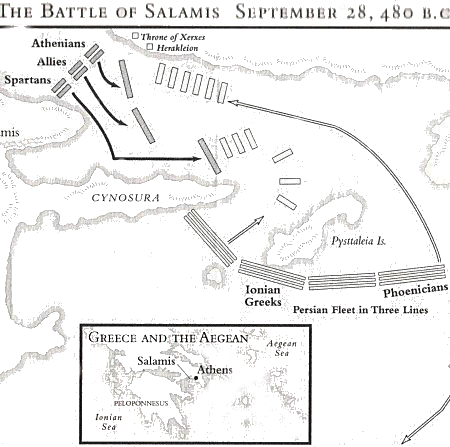

In his latest book Why the West Has Won Hanson deals with nine historical
battles beginning with Salamis in 480 B.C., followed by e.g. Gaugamela (331 B.C.), Poitiers (732 A.D.),
Lepanto (1571), Rorke's Drift (1879) and ending with the Tet Offensive (1968) in the Vietnam War. All
battles were encounters between Western and non-Western armies and almost all were won by western states.
Hanson asks himself what factors eventually contributed to the western victories and he comes up with very
interesting and convincing answers.
He maintains that the keystone for military success was laid in ancient Greece. Th old Greeks fought
uniquely differently from their adversaries (e.g. the Persians) because their army was based on a sense
of personal freedom, superior discipline, matchless weapons, egalitarian camaraderie, individual initiative,
constant tactical adaption and flexibility and preference for shock battle of heavy infantry. All these
positive aspects could have only developed in constitutionally governed countries like the Greek city-states, but
not in imperial dynasties like Persia. Here in Athens and Sparta ordinary people voted for their representatives,
there was equality among classes, soldiers had a say in military affairs, even the smaller farmer owned property,
and politics was not part of religion (like in the Persian empire). Hanson goes on saying that free and
property owning hoplites (heavy infantrymen fighting in the phalanx) would fight with much greater motivation
than unfree slaves of the Persian army. The author further argues that the Greek foundations of classical
culture such as personal freedom, consensual government, civic militarism, individualism, discipline and flexibility were
passed on to the Roman Empire, the Carolingian period, the Italian Rennaisance until modern times. Today superior
technology and mass production of weaponry are only two features which give the West an advantage over non-western
countries.
 At Salamis the Panhellenic armada under Themistocles succeeded by ruse to draw the much larger Persian fleet
into the narrows between the island and the mainland. There the invaders with their larger and heavier ships
did not have the room to maneuver so that the smaller Greek ships could attack and sink the bigger ships quite easily.
At Salamis the Panhellenic armada under Themistocles succeeded by ruse to draw the much larger Persian fleet
into the narrows between the island and the mainland. There the invaders with their larger and heavier ships
did not have the room to maneuver so that the smaller Greek ships could attack and sink the bigger ships quite easily.
On the other hand, Persian, Egyptian, Armenian or Carthaginian armies always relied on superior manpower, i.e. their
armies outnumbered Greek or Roman armies by far, but in most cases of no avail, because they lacked discipline, tactics
of shock battle and the sense of individualism and freedom among their soldiers, who were often a motley crowd of Persians
fighting along with slaves, mercenaries and legionaries from Egypt, Phoenicia or Cyprus. Already Hippocrates said that
where men are not their own masters and independent, but are ruled by despots (like the Persian emperors), they are not
really military capable, but only appear to be warlike.
All in all Hanson's key theory rests on his argument that the Western way of war is grounded not merely
in technological supremacy but in an entire array of political, social and military advantages well beyond the possession
of sophisticated weapons. And this is what makes the book so interesting to read: the author not only describes the
battles in great detail, but also draws an overall picture of times in which they take place and of the armies and their
soldiers within their social, political and cultural environment.
|


 At Salamis the Panhellenic armada under Themistocles succeeded by ruse to draw the much larger Persian fleet
into the narrows between the island and the mainland. There the invaders with their larger and heavier ships
did not have the room to maneuver so that the smaller Greek ships could attack and sink the bigger ships quite easily.
At Salamis the Panhellenic armada under Themistocles succeeded by ruse to draw the much larger Persian fleet
into the narrows between the island and the mainland. There the invaders with their larger and heavier ships
did not have the room to maneuver so that the smaller Greek ships could attack and sink the bigger ships quite easily.